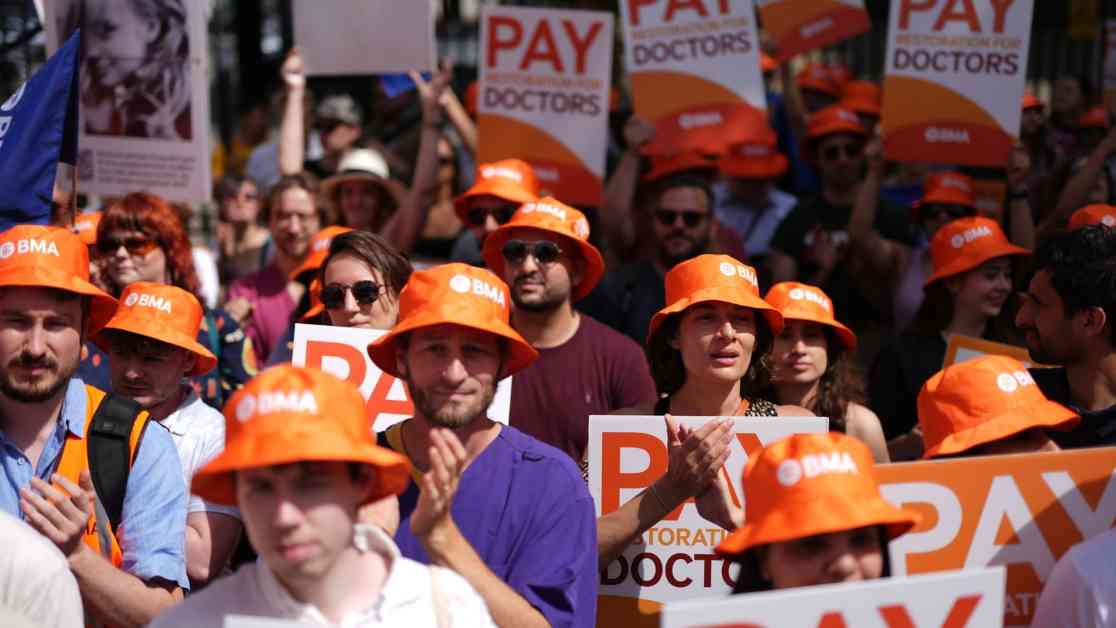Junior doctors in England have voted to accept a new pay agreement offered by the government, marking the end of a prolonged period of industrial action. The agreement, which includes an average pay increase of 22.3% over two years, was approved by 66% of the 45,830 junior doctors who participated in the vote between August 19 and September 15. This decision comes after 11 instances of industrial action within the past 22 months, culminating in the longest strike in NHS history.
The British Medical Association (BMA) junior doctors committee co-chairs, Dr. Robert Laurenson and Dr. Vivek Trivedi, expressed relief that a resolution had been reached but emphasized that it should not have taken so long to get to this point. They stated, “It should never have taken so long to get here… one strike was one strike too many.” The agreement puts an end to 15 years of pay erosion and introduces modest above-inflation pay rises for the next two years. However, the BMA acknowledges that there is still progress to be made in addressing the concerns of junior doctors.
The pay agreement consists of two parts: a 13.2% increase for 2023/24, including an extra 4.05% on top of the 8.8% already promised, backdated to April 2023, and an 8% rise for 2024/25, comprising a 6% increase across pay scales plus a £1,000 bonus. These adjustments mean that basic pay for junior doctors starting foundation training in the NHS will increase to £36,600, up from approximately £32,400, while those entering speciality training will see their basic pay rise to £49,900 from about £43,900. Despite these increases, the BMA argues that doctors’ pay remains 20.8% behind in real terms compared to 2008, highlighting the need for further improvements.
Health Secretary Wes Streeting emphasized the importance of reaching a fair agreement for both patients and doctors, noting the significant cost incurred by strikes and disruptions to NHS services. He stated, “We saw the cost to the taxpayer… £1.7bn wasted on meeting the costs of strikes, over 1.5 million operations, appointments, procedures delayed or cancelled.” Streeting believes that the new deal will enable the NHS to focus on reducing waiting lists and implementing necessary reforms to improve healthcare services.
A major report on the state of the health service described the NHS as being “in serious trouble,” prompting calls for urgent reform. Sir Keir Starmer echoed these sentiments, emphasizing the need for change to ensure the sustainability and effectiveness of the NHS. The agreement with junior doctors provides a level of certainty as the health service prepares for the challenges of the upcoming winter season.
The agreement has been met with relief by health leaders, who recognize the positive impact it will have on patients, doctors, and the wider NHS. Amanda Pritchard, chief executive of NHS England, described the agreement as excellent news, particularly given the challenges expected during the winter months. However, Danny Mortimer, chief executive of NHS Employers, cautioned that there is still work to be done in addressing the issues raised by resident doctors.
Despite criticisms from some quarters, the government’s pay offer to junior doctors aligns with its overall strategy of providing above-inflation pay increases to public sector workers, amounting to an estimated cost of £9.4bn. Additionally, the decision to rename “junior doctors” as “resident doctors” across the UK reflects a broader recognition of their expertise and contributions to the healthcare system.
In conclusion, the approval of the new pay agreement by junior doctors in England represents a significant milestone in resolving long-standing issues and improving working conditions within the NHS. While the agreement addresses some concerns related to pay erosion and provides a foundation for future negotiations, there is a recognition that more work is needed to ensure fair compensation and support for healthcare professionals. As the health service continues to face challenges and pressures, collaboration between stakeholders will be essential in driving positive change and securing the future of the NHS.













